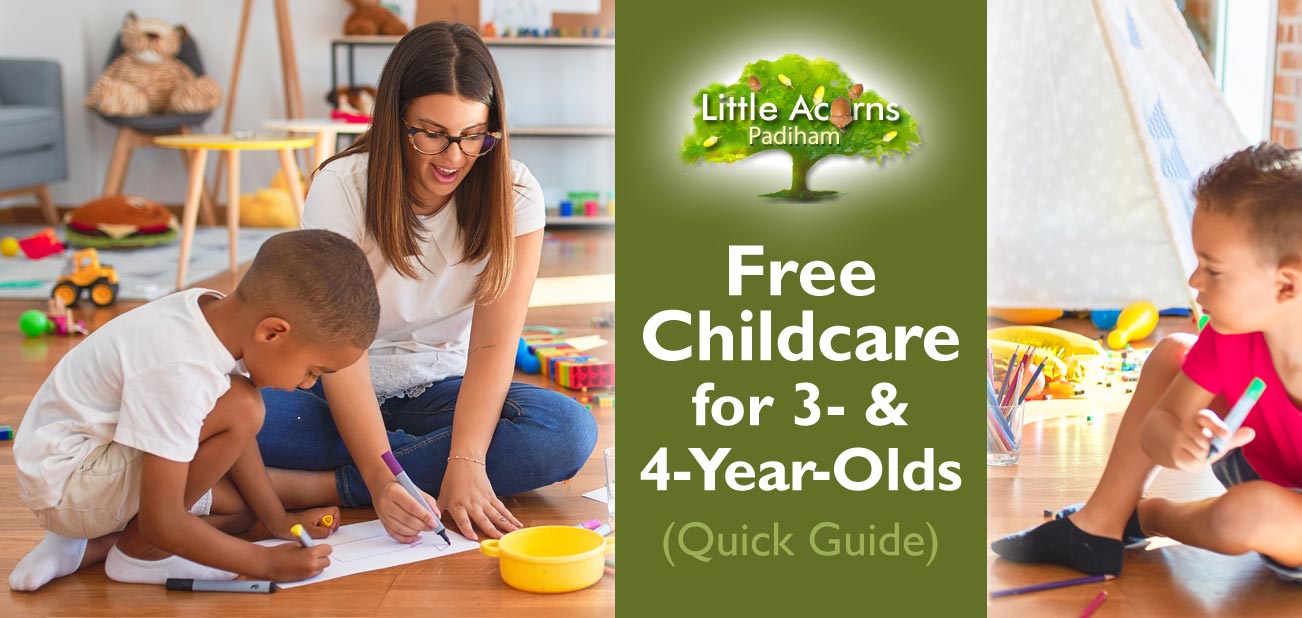
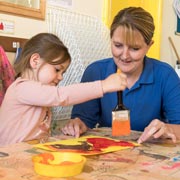 If you live in England and have a child aged 3 or 4, this article is for you. Did you know that your child is entitled to free childcare each week? In fact, virtually all children aged 3 or 4 that live in England can get an impressive 570 hours of free childcare each year. Some can even get twice that amount of funded childcare hours. Today we’ll go through what’s available – totally free of charge – and the rules around eligibility.
If you live in England and have a child aged 3 or 4, this article is for you. Did you know that your child is entitled to free childcare each week? In fact, virtually all children aged 3 or 4 that live in England can get an impressive 570 hours of free childcare each year. Some can even get twice that amount of funded childcare hours. Today we’ll go through what’s available – totally free of charge – and the rules around eligibility.
For 3- and 4-year-olds, there are two main childcare funding schemes:
The ‘15 Hours Free Childcare’ Scheme
(for children aged 3 and 4)
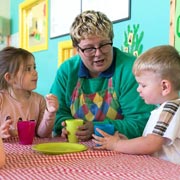 The ‘15 Hours Free Childcare’ scheme is a Government-funded initiative that provides free early education and childcare for all 3- and 4-year-olds living in England. Under the scheme, eligible children are entitled to 15 hours of free childcare each week, usually spread over 38 weeks, to total 570 hours per year. Optionally, however, some families may choose to have their child attend a childcare setting for less than 15 hours per week but spread the free hour allowance throughout the whole year. Others may prefer to take longer breaks during the holidays and using the hours more intensively during term time. Parents/guardians will need to check what’s possible with their particular childcare provider (we try to be as flexible as possible at Little Acorns Nursery, Padiham).
The ‘15 Hours Free Childcare’ scheme is a Government-funded initiative that provides free early education and childcare for all 3- and 4-year-olds living in England. Under the scheme, eligible children are entitled to 15 hours of free childcare each week, usually spread over 38 weeks, to total 570 hours per year. Optionally, however, some families may choose to have their child attend a childcare setting for less than 15 hours per week but spread the free hour allowance throughout the whole year. Others may prefer to take longer breaks during the holidays and using the hours more intensively during term time. Parents/guardians will need to check what’s possible with their particular childcare provider (we try to be as flexible as possible at Little Acorns Nursery, Padiham).
Eligibility
The 15 Hours Free Childcare scheme for 3- and 4-year-olds is not means tested and there are no tricky eligibility hoops to jump through. It is therefore an excellent and widely available childcare funding scheme. So, you do not need to meet any specific income or employment criteria in order to be eligible.
Caveats
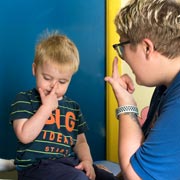 You must be the child’s parent or legal guardian.
You must be the child’s parent or legal guardian.
Parents and guardians may need to check any minimum sessions hours with their childcare provider. For example, families may not be able to use the free entitlement for very short periods, such as just an hour or two at a time, although it may vary from childcare provider to childcare provider.
The free entitlement is only available for children aged 3 and 4. It does not cover children under the age of 3 nor those already attending school.
The free entitlement is available to children the term after they turn 3. It can only be taken via an approved provider, for example, a nursery, pre-school, or childminder that’s registered with Ofsted (the Office for Standards in Education, Children’s Services and Skills).
How to Apply for the ‘15 Hours Free Childcare’ Scheme for Your 3- or 4-Year-Old
You can search for registered providers in your area on the Ofsted website or by contacting your local council. Once you have found a childcare provider* that meets your needs, you will need to enrol your child directly with them. You may also need to provide proof of your child’s age and your eligibility for the free entitlement.
* If you live or work in or around Padiham in Lancashire, you may be interested in considering Little Acorns Nursery as your childcare provider. If so, please contact us if you would like to discuss a funded place for your 3- or 4-year-old at Little Acorns Nursery in Padiham, or register your child for a place at Little Acorns Nursery here.
The ‘30 Hours Free Childcare’ Scheme
(for children aged 3 and 4)
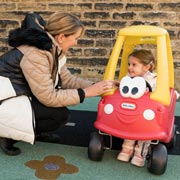 The ‘30 Hours Free Childcare’ scheme is a very similar Government-funded initiative that provides eligible families in England with up to 30 hours of free childcare per week. Again, this is for children aged 3 and 4. The scheme is designed to help working families with the cost of childcare and to support parents who want to return to work or increase their hours.
The ‘30 Hours Free Childcare’ scheme is a very similar Government-funded initiative that provides eligible families in England with up to 30 hours of free childcare per week. Again, this is for children aged 3 and 4. The scheme is designed to help working families with the cost of childcare and to support parents who want to return to work or increase their hours.
Eligibility
To be eligible for the 30 Hours Free Childcare scheme, families must meet the following main criteria:
- Both parents, or the lone parent, must be working and earning at least the equivalent of 16 hours per week at the National Minimum Wage (‘NMW’) or National Living Wage (‘NLW’). The NMW and the NLW are different for different age groups, so the monetary figure that this amounts to as a minimum income varies according to your age. (Please note that dividends, interest, pension payments and interest income from property investments do not count towards your minimum).
- The parent(s) must also have an annual income of less than £100,000 per year, including any bonuses.
- Usually, the child you are claiming for will need to be living with you.
- Follow the next bold link below for additional eligibility caveats that affect less common circumstances.
Caveats
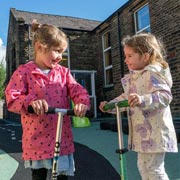 You are usually still be eligible if you are off work on annual leave or sick leave, or parental leave if it is not being taken for the same child you are claiming childcare funding for.
You are usually still be eligible if you are off work on annual leave or sick leave, or parental leave if it is not being taken for the same child you are claiming childcare funding for.
If you are already claiming Universal Credit, Tax-Free Childcare, Tax Credits or using Childcare Vouchers, you can usually also claim for the 30 hours scheme for 3- and 4-year-olds if you meet the other criteria. Note, however, that claiming 30 Hours Free Childcare may affect how much you then receive in tax credits if you are also claiming those.
How to Apply for the ‘30 Hours Free Childcare’ Scheme for Your 3- or 4-Year-Old
Families who meet all the eligibility criteria can apply for the 30 Hours Free Childcare scheme through the government’s childcare service website. You will need to provide proof of your employment, your income, and your child’s age.
If your application is approved, you will receive a code that you can use to claim the 30 hours of free childcare from an approved provider like Little Acorns Nursery in Padiham. (If you’re not in the Padiham/Lancashire area, you can search for approved providers near you via the Ofsted website or by contacting your local council). You will need the code no later than the end of the month preceding the month your child starts on his or her childcare place. You’ll also need to reconfirm your child’s eligibility once every quarter.
Little Acorns Nursery Offers an Outstanding Childcare Service in Padiham, Lancashire
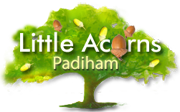
Located in Padiham, Lancashire, Little Acorns Nursery and pre-school is also easily accessible to families in the surrounding areas of Hapton, Rose Grove, Burnley, Altham, Huncoat, Read, Simonstone, Sabden, Higham and Wood End. The nursery/pre-school supports the above funding schemes for 3- and 4-year olds and provides an outstanding weekday childcare service for babies, toddlers, and children aged up to 5. If you are interested in enrolling your child at Little Acorns, please get in touch. We will happily answer any questions you may have and help guide you through the application process. Simply choose an option below to get started:
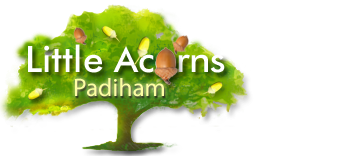
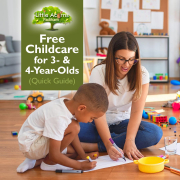
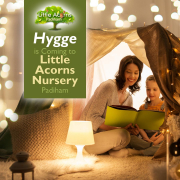
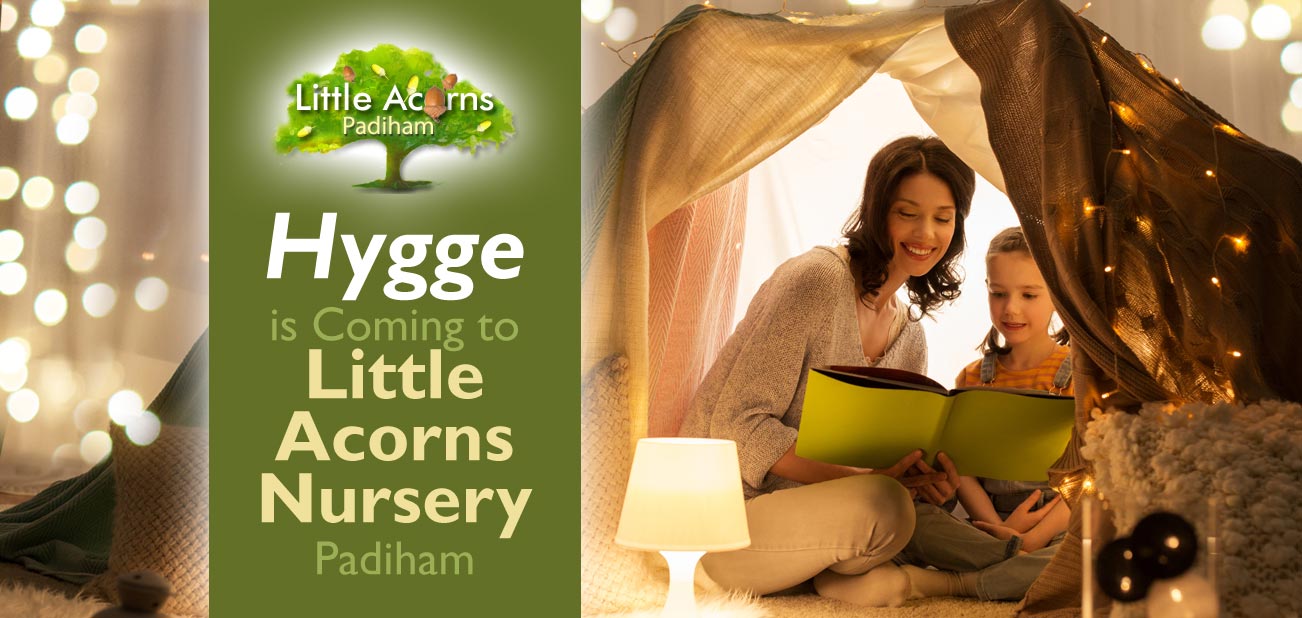
 One of the exciting new initiatives that we have planned for Little Acorns nursery, Padiham, is to make it a Hygge setting. In today’s post, we explain what Hygge means and how it will benefit the setting, especially the children. Once the Hygge initiative has been fully adopted, it will positively transform the whole feel of the nursery and benefit everyone. Introducing Hygge is exciting and the children are going to love it! To be truthful, we can’t wait to get started!
One of the exciting new initiatives that we have planned for Little Acorns nursery, Padiham, is to make it a Hygge setting. In today’s post, we explain what Hygge means and how it will benefit the setting, especially the children. Once the Hygge initiative has been fully adopted, it will positively transform the whole feel of the nursery and benefit everyone. Introducing Hygge is exciting and the children are going to love it! To be truthful, we can’t wait to get started! Counter to the instincts of those whose first language is English, Hygge is pronounced “Hue-Gah” rather than “Hig”. It is popular in Denmark and Norway and is a Danish word that refers to a rather beautiful lifestyle; one of cosiness, homeliness, contentment and comfort. Wellbeing, warmth and conviviality are central to the Hygge approach. Friendliness, a welcoming atmosphere and closer links to nature are key parts of the Hygge way of life too. Having a more simple lifestyle and living far more in the moment are also part and parcel of Hygge. With such facets, Hygge naturally fosters happiness and contentment in everyone that it touches. Indeed, that’s one of the many reasons we can’t wait for both children and staff to start embracing it at Little Acorns Nursery.
Counter to the instincts of those whose first language is English, Hygge is pronounced “Hue-Gah” rather than “Hig”. It is popular in Denmark and Norway and is a Danish word that refers to a rather beautiful lifestyle; one of cosiness, homeliness, contentment and comfort. Wellbeing, warmth and conviviality are central to the Hygge approach. Friendliness, a welcoming atmosphere and closer links to nature are key parts of the Hygge way of life too. Having a more simple lifestyle and living far more in the moment are also part and parcel of Hygge. With such facets, Hygge naturally fosters happiness and contentment in everyone that it touches. Indeed, that’s one of the many reasons we can’t wait for both children and staff to start embracing it at Little Acorns Nursery.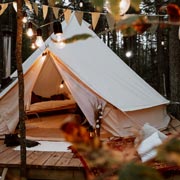 Once we’ve adopted Hygge at the nursery, it’ll look and feel warmer and far more welcoming, with softer, warmer lighting and a more homely atmosphere. Gone will be anything that looks sterile, cold or even harshly lit. Instead, expect to see soft furnishings including cushions, rugs and blankets. Look out for little nooks where children can gather in small groups to read, play or engage with each other or with staff. Hygge nurseries are also synonymous with dens and teepees, allowing children to ‘nest’ in calm, cosy spaces and corners. All these things will also deaden sound, reduce noise levels, and banish echoes, making for a much calmer setting entirely.
Once we’ve adopted Hygge at the nursery, it’ll look and feel warmer and far more welcoming, with softer, warmer lighting and a more homely atmosphere. Gone will be anything that looks sterile, cold or even harshly lit. Instead, expect to see soft furnishings including cushions, rugs and blankets. Look out for little nooks where children can gather in small groups to read, play or engage with each other or with staff. Hygge nurseries are also synonymous with dens and teepees, allowing children to ‘nest’ in calm, cosy spaces and corners. All these things will also deaden sound, reduce noise levels, and banish echoes, making for a much calmer setting entirely. We mentioned that Hygge brings people closer to nature and that will be evident not only outside but indoors too. We’ll ensure there are natural objects and materials for the children to explore and handle, including things like smooth pebbles, wood surfaces, pine cones and perhaps reed and wicker items. These will be lovely to handle and to be around, stimulating multiple senses, which is so important in the young. The introduction of appropriate plants will also
We mentioned that Hygge brings people closer to nature and that will be evident not only outside but indoors too. We’ll ensure there are natural objects and materials for the children to explore and handle, including things like smooth pebbles, wood surfaces, pine cones and perhaps reed and wicker items. These will be lovely to handle and to be around, stimulating multiple senses, which is so important in the young. The introduction of appropriate plants will also  Children will also be encouraged to be convivial, i.e. be friendly, inclusive, pleasant and welcoming to one another and to staff. We always try to foster a culture of mutual respect and equality, but the introduction of Hygge to the nursery will take this even further. Sharing and politeness are to be encouraged. Play will be calmer and more harmonious. With Hygge, growing friendships will naturally blossom. Hygge minimises conflict and leads to harmony, calmness and a very pleasurable day-to-day experience for everyone touched by it.
Children will also be encouraged to be convivial, i.e. be friendly, inclusive, pleasant and welcoming to one another and to staff. We always try to foster a culture of mutual respect and equality, but the introduction of Hygge to the nursery will take this even further. Sharing and politeness are to be encouraged. Play will be calmer and more harmonious. With Hygge, growing friendships will naturally blossom. Hygge minimises conflict and leads to harmony, calmness and a very pleasurable day-to-day experience for everyone touched by it.